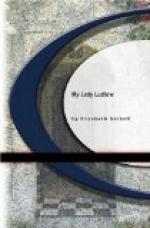My lady went on to a cluster of rude mud houses at the higher end of the Common; cottages built, as they were occasionally at that day, of wattles and clay, and thatched with sods. As far as we could make out from dumb show, Lady Ludlow saw enough of the interiors of these places to make her hesitate before entering, or even speaking to any of the children who were playing about in the puddles. After a pause, she disappeared into one of the cottages. It seemed to us a long time before she came out; but I dare say it was not more than eight or ten minutes. She came back with her head hanging down, as if to choose her way,—but we saw it was more in thought and bewilderment than for any such purpose.
She had not made up her mind where we should drive to when she got into the carriage again. John Footman stood, bare-headed, waiting for orders.
“To Hathaway. My dears, if you are tired, or if you have anything to do for Mrs. Medlicott, I can drop you at Barford Corner, and it is but a quarter of an hour’s brisk walk home.”
But luckily we could safely say that Mrs. Medlicott did not want us; and as we had whispered to each other, as we sat alone in the coach, that surely my lady must have gone to Job Gregson’s, we were far too anxious to know the end of it all to say that we were tired. So we all set off to Hathaway. Mr. Harry Lathom was a bachelor squire, thirty or thirty-five years of age, more at home in the field than in the drawing-room, and with sporting men than with ladies.
My lady did not alight, of course; it was Mr. Lathom’s place to wait upon her, and she bade the butler,—who had a smack of the gamekeeper in him, very unlike our own powdered venerable fine gentleman at Hanbury,—tell his master, with her compliments, that she wished to speak to him. You may think how pleased we were to find that we should hear all that was said; though, I think, afterwards we were half sorry when we saw how our presence confused the squire, who would have found it bad enough to answer my lady’s questions, even without two eager girls for audience.
“Pray, Mr. Lathom,” began my lady, something abruptly for her,—but she was very full of her subject,—“what is this I hear about Job Gregson?”
Mr. Lathom looked annoyed and vexed, but dared not show it in his words.
“I gave out a warrant against him, my lady, for theft,—that is all. You are doubtless aware of his character; a man who sets nets and springes in long cover, and fishes wherever he takes a fancy. It is but a short step from poaching to thieving.”
“That is quite true,” replied Lady Ludlow (who had a horror of poaching for this very reason): “but I imagine you do not send a man to gaol on account of his bad character.”
“Rogues and vagabonds,” said Mr. Lathom. “A man may be sent to prison for being a vagabond; for no specific act, but for his general mode of life.”




